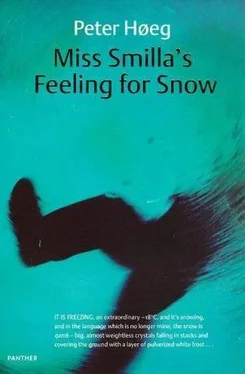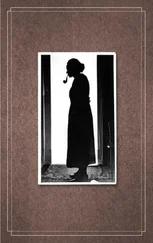Peter Høeg - Smilla's Sense of Snow aka Miss Smilla's Feeling for Snow
Здесь есть возможность читать онлайн «Peter Høeg - Smilla's Sense of Snow aka Miss Smilla's Feeling for Snow» весь текст электронной книги совершенно бесплатно (целиком полную версию без сокращений). В некоторых случаях можно слушать аудио, скачать через торрент в формате fb2 и присутствует краткое содержание. Жанр: Современная проза, на английском языке. Описание произведения, (предисловие) а так же отзывы посетителей доступны на портале библиотеки ЛибКат.
- Название:Smilla's Sense of Snow aka Miss Smilla's Feeling for Snow
- Автор:
- Жанр:
- Год:неизвестен
- ISBN:нет данных
- Рейтинг книги:3 / 5. Голосов: 1
-
Избранное:Добавить в избранное
- Отзывы:
-
Ваша оценка:
- 60
- 1
- 2
- 3
- 4
- 5
Smilla's Sense of Snow aka Miss Smilla's Feeling for Snow: краткое содержание, описание и аннотация
Предлагаем к чтению аннотацию, описание, краткое содержание или предисловие (зависит от того, что написал сам автор книги «Smilla's Sense of Snow aka Miss Smilla's Feeling for Snow»). Если вы не нашли необходимую информацию о книге — напишите в комментариях, мы постараемся отыскать её.
Smilla's Sense of Snow aka Miss Smilla's Feeling for Snow — читать онлайн бесплатно полную книгу (весь текст) целиком
Ниже представлен текст книги, разбитый по страницам. Система сохранения места последней прочитанной страницы, позволяет с удобством читать онлайн бесплатно книгу «Smilla's Sense of Snow aka Miss Smilla's Feeling for Snow», без необходимости каждый раз заново искать на чём Вы остановились. Поставьте закладку, и сможете в любой момент перейти на страницу, на которой закончили чтение.
Интервал:
Закладка:
I understood her, understood every word. Then and later on. But that didn't change a thing. The year after-the year before she disappeared-I began to feel nauseated when I went fishing. I was then about six years old. Not old enough to speculate about the reason. But old enough to understand that it was a feeling of alienation toward nature. That some part of it was no longer accessible to me in the natural way that it had been before. Perhaps I had even then begun to want to understand the ice. To want to understand is an attempt to recapture something we have lost.
"Professor Loyen…"
My father pronounces the name with the interest and armed respect with which one brontosaurus has always regarded another. "A very talented man."
The white palm of his hand moves over his cheek and chin. It's a carefully studied gesture which makes a sound like the rasp of a coarse file on a piece of driftwood. "The Institute for Arctic Medicine-he created it."
"What's his interest in forensic medicine? He's let himself be appointed pathologist for Greenland."
"He was originally a forensic pathologist. But he accepts anything that brings merit. He must think it's a good career move."
"What drives him?"
There is a pause. My father has moved through most of his life with his head under his arm. In old age he has become acutely interested in people's motives.
"In my generation there are three kinds of doctors. There are those who get stuck as assistant hospital physicians or end up in private practice. There are many fine people among them. Then there are those who finish writing their dissertation, which is-as you know, Smilla-the arbitrary and ludicrous and inadequate prerequisite for upward mobility in the system. They end up as chiefs of staff. They are minor monarchs in the local society of medicine. Then there are the third kind. Those of us who rose up and have come out on top."
This is said without any hint of self-irony. You could get my father to state, in all seriousness, that one of his problems is that he isn't half as pleased with himself as he has every reason to be.
"To take those last swimming strokes demands a particular strength. A strong desire or ambition. For money. Or power. Or perhaps insight. In the history of medicine this struggle has always been symbolized by fire. The eternal flame of the alchemist beneath the retort."
He gazes straight ahead, as if he had a syringe in his hand, as if the needle were about to reach its goal. "Loyen," he says, "from the time of his school days, has wanted only one thing. Next to that, everything else is trivial. He has wanted to be recognized as the best in his field. Not the best in Denmark, among all the peasants. The best in the universe. His professional ambition is the perpetual flame inside him. And it's not a gas jet. It's a Midsummer bonfire."
I don't know how my mother and father met. I do know that he came to Greenland because this hospitable land has always been the site of scientific experiments. He was in the process of developing a new technique for the treatment of trigeminal neuralgia, an inflammation of the facial sensory nerve. Previously, this condition was assuaged by killing the nerve with injections of alcohol, which led to partial facial paralysis and loss of sensation on one side of the musculature of the mouth, the so-called drooping lip. This can afflict even the best and richest of families, which is why my father had become interested in it. There were many incidences of that illness in North Greenland. He had come to treat them with his new technique-a partial heat-denaturing of the affected nerve.
There are photographs of him. Wearing his Kastinger boots and his down clothing, with ice ax and glacier goggles, in front of the house they put at his disposal on the American base. With his hands on the shoulders of the two short, dark men who are to interpret for him.
For him, North Greenland was truly the outermost Thule. Not for a minute did he imagine that he would stay more than the one required month in a windblown ice desert, where there wasn't even a golf course.
You might have some clue to the white-hot energy between him and my mother if you consider the fact that he stayed there four years. He tried to get her to move onto the base, but she refused. For my mother, just like everyone born in North Greenland, any suggestion of being cooped up was intolerable. Instead, he followed her out to one of the barracks made of plywood and corrugated tin that were put up when the Americans drove the Inuits out of the area where the base was built. Even today I still ask myself how he managed it. The answer, of course, is that as long as she was alive, he would have left his golf bag and clubs behind at a moment's notice to follow her, even right into the searing center of black hell.
"They had a child," people say. In this case that wouldn't be correct. I would say that my mother had my little brother and me. Outside of this scenario was my father, present without being able to take any real part, dangerous as a polar bear, imprisoned in a land that he hated by a love that he did not understand and that held him captive, over which he seemed to have not even the slightest influence. The man with the syringes and the steady hands, the golf player Moritz Jaspersen.
When I was three years old, he left. Or rather; his own character drove him away. Deep within every blind, absolute love grows a hatred toward the beloved, who now holds the only existing key to happiness. I was, as I said, only three years old, but I remember how he left. He left in a state of seething, pent-up, livid, profane rage. As a form of energy this was surpassed only by the longing that flung him back again. He was stuck to my mother with a rubber band that was invisible to the rest of the world but which had the effect and physical reality of a drive belt.
He didn't have much to do with us children when he was there. From my first six years I remember only traces of him. The smell of the Latakia tobacco he smoked. The autoclave in which he sterilized his instruments. The interest he aroused whenever he would occasionally put on his cleats, take up a stance, and shoot a bucket of balls across the new ice. And the mood he brought with him, which was the sum of the feelings he had for my mother. The same kind of soothing warmth that you might expect to find in a nuclear reactor.
What was my mother's role in this? I don't know, and I will never find out. Those who understand such things say that the two spouses must always assist each other if a relationship is truly to founder and turn to flotsam. That's possible: Like everybody else, from the age of seven I have painted my childhood with lots of false colors, and some of this may have rubbed off on my mother as well. But in any case, she was the one who stayed where she was, and set out her nets and braided my hair. She was there, a huge presence, while Moritz with his golf clubs and beard stubble and syringes oscillated between the two extremes of his love: either a total merging or putting the entire North Atlantic between him and his beloved.
No one who falls into the water in Greenland comes up again. The sea is less than 39°F, and at that temperature all the processes of decomposition stop. That's why fermentation of the stomach contents does not occur here; in Denmark, however, it gives suicides renewed buoyancy and brings them to the surface, to wash up on shore.
But they found the remains of her kayak, which led them to conclude that it must have been a walrus. Walruses are unpredictable. They can be hypersensitive and shy. But if they come a little farther south, and if it's autumn, when there are few fish, they can be transformed into some of the swiftest and most meticulous killers in the great ocean. With their two tusks they can stave in the side of a ship made of ferrocement. I once saw hunters holding a cod up to a walrus that they had captured alive. The walrus puckered up his lips as for a kiss and then sucked the meat right off the bones of the fish.
Читать дальшеИнтервал:
Закладка:
Похожие книги на «Smilla's Sense of Snow aka Miss Smilla's Feeling for Snow»
Представляем Вашему вниманию похожие книги на «Smilla's Sense of Snow aka Miss Smilla's Feeling for Snow» списком для выбора. Мы отобрали схожую по названию и смыслу литературу в надежде предоставить читателям больше вариантов отыскать новые, интересные, ещё непрочитанные произведения.
Обсуждение, отзывы о книге «Smilla's Sense of Snow aka Miss Smilla's Feeling for Snow» и просто собственные мнения читателей. Оставьте ваши комментарии, напишите, что Вы думаете о произведении, его смысле или главных героях. Укажите что конкретно понравилось, а что нет, и почему Вы так считаете.




![Рута Шепетис - Ashes in the Snow [aka Between Shades of Gray]](/books/414915/ruta-shepetis-ashes-in-the-snow-aka-between-shades-thumb.webp)







